Research and scholarly material on flame and combustion.
TO
| Creator | Title | Date | Description | ||
|---|---|---|---|---|---|
| 1 |
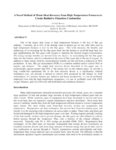 |
Atreya, Arvind; Kezerle, James A. | A novel method of waste heat recovery from high temperature furnaces to create radiative flameless combustion | 2009 | One of the largest heat losses in high temperature furnaces is the loss of flue gas enthalpy. Currently, up to 60% of the heating value of natural gas (or any other fuel) used in high temperature furnaces is lost via the flue gases. This work discusses the benefits and technology of re-circulating t... |
| 2 |
 |
Smith, Philip J. | Clean and secure energy from domestic oil shale and oil sands resources: Quarterly progress report: January 1, 2010 to March 31, 2010 | 2010 | The Clean and Secure Energy from Domestic Oil Shale and Oil Sands Resources program is part of the research agenda of the Institute for Clean and Secure Energy (ICSE) at the University of Utah. In this quarter, the Clean and Secure Energy program continued its focus on enhancing industrial, national... |
| 3 |
 |
Smith, Philip J. | Clean and secure energy from domestic oil shale and oil sands resources: Quarterly progress report: July 2010 to September 2010 | 2010 | The Clean and Secure Energy from Domestic Oil Shale and Oil Sands Resources program is part of the research agenda of the Institute for Clean and Secure Energy (ICSE) at the University of Utah. In this quarter, the Clean and Secure Energy program was involved in multiple technology transfer and outr... |
| 4 |
 |
Smith, Philip J. | Clean and secure energy from domestic oil shale and oil sands resources: Quarterly progress report: July 2011 to September 2011 | 2011 | |
| 5 |
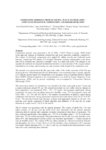 |
Zeuthen, Jacob Hjerrild; Pedersen, Anne Juul; Riber, Christian; Astrup, Thomas; Hansen, Jorn; Frandsen, Flemming Jappe; Livbjerg, Hans | Combustion aerosols from municipal waste incineration - effects of feedstock composition and boiler operation | 2009 | Combustion aerosols were measured in the 22 MWth FASAN Waste-to-Energy (WtE) boiler while applying changes in feedstock composition and grate operation conditions, respectively. The changes in feedstock composition were applied by adding (one-by-one) dedicated waste fractions, comprising PVC plastic... |
| 6 |
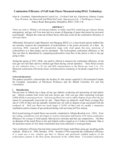 |
Chambers, Allan K.; Wootton, Tony; Moncrieff, Jan; McCready, Philip | Combustion efficiency of full scale flares measured using DIAL technology | 2004 | Flares are used in Alberta's oil and gas industry to safely treat H2S containing gas releases during emergencies, and gas well flow tests and as a means of disposing of gases that cannot be recovered economically. Despite the wide use of these flares, little data exists on the combustion efficiency ... |
| 7 |
 |
Martin, Matthew | Comparison of empirically based calculation methods for pipe flares to computational fluid dynamics | 2007 | As available computational resources increase and the use of computational fluid dynamics (CFD) becomes more widely accepted wider classes of industrial scale combustion systems are being simulated and optimized using these resources. A largebody of empirically based work has already been assembled ... |
| 8 |
 |
Duck, Brian | Computational fluid dynamic modeling of a ground flare | 2007 | A major ethylene plant underconstruction in Al-Jubail, Saudi Arabia found itself under pressure from neighboring facilities and regulatory agencies to reduce flare emissions, flame visibility, and noise. Plant personnel contacted a company that had pioneered and commercialized a grade mounted, multi... |
| 9 |
 |
Desam, Padmabhushana R.; Smith, Philip J.; Borodai, Stainslav G.; Kumar, Seshadri | Computing flare dynamics using large eddy simulations | 2004 | Computing the dynamics of flares is motivated by the increased need for efficient and safe flaring of unwanted gases during hydrocarbon and petrochemical processing. To understand the unsteady flame shape dynamics, Large Eddy Simulations (LES) are used to study natural gas flares in the presence of ... |
| 10 |
 |
Zhan, Z. | Effects of Coal Blends on Formation Mechanisms of Ash Aerosol and Ash Deposits during Air and Oxy-Combustion | 2015-09-11 | Paper from the AFRC 2015 conference titled Effects of Coal Blends on Formation Mechanisms of Ash Aerosol and Ash Deposits during Air and Oxy-Combustion |
| 11 |
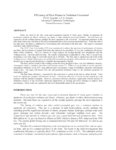 |
Gogolek, Peter E.G.; Hayden, A.C.S. | Efficiency of flare flames in turbulent crosswind | 2010 | Flares are used for the safe, clean and economical disposal of waste gases, whether in upstream oil production (solution gas flares), refineries, gas plants or other chemical processing facilities. Elevated flares are exposed to all the weather patterns, perhaps the most important is the crosswind. ... |
| 12 |
 |
Smith, Scot K.; Modi, Jay B.; McDonald, J. M.; Little, C.; Smith, Joseph D.; Berg, L. M. | Environmental testing of an advanced flare tip for a low-profile flare burning ethylene | 2007 | |
| 13 |
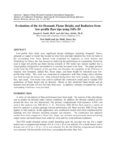 |
Smith, Joseph D.; Suo-Anttila, Ahti; Smith, Scot K.; Modi, Jay B. | Evaluation of the air-demand, flame height, and radiation from low-profile flare tips using ISIS-3D | 2007 | Low-profile flare fields pose significant design challenges including elongated flames, adequate air supply to burner tips located on inner rows and high radiation flux from the flame to the surrounding wind fence. Recent work completed by engineers at Alion Science and Technology for Zeeco, Inc. ha... |
| 14 |
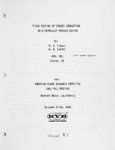 |
Tidona, R. J.; Carter, W. A. | Field testing of staged combustion on a petroleum process heater | 1980 | |
| 15 |
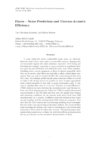 |
Hantsck, Carl-Christian; Schorer, Edwin | Flares - noise prediction and thermo-acoustic efficiency | 2004 | In many industries where combustible waste gases are obtained, flares are used to burn these gases in a controlled manner. Among other environmental aspects the noise emissions associated with flaring are becoming increasingly important in many countries as population density goes up and residential... |
| 16 |
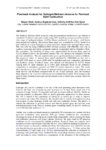 |
Shelil, Nasser; Bagdanavicius, Audrius; Griffiths, Anthony; Syred, Nick | Flashback analysis for hydrogen/methane mixtures for premixed swirl combustion | 2009 | The flashback problem which occurs by using lean premixed combustion in gas turbines is considered. Flashback simulation studies using CFD modelling package are performed for a wide range of hydrogen/methane (H2/CH4) blends combusted by air using a swirl burner under premixed conditions. The laminar... |
| 17 |
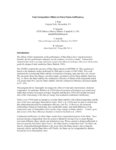 |
Pohl, John; Gogolek, Peter E.G.; Seebold, James G.; Schwartz, Robert | Fuel composition effect on flare flame inefficiency | 2004 | The effects of fuel composition on the performance of flare flames have long been known. Possibly the first performance indicator was the tendency of a fuel to smoke. Various fuel characteristics such as average molecular weight and carbon-to-hydrogen ratio were advanced to guide the design of early... |
| 18 |
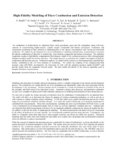 |
Panfili, R.; Dothe, H.; Vujkovic-Cvijin, P.; Tan, X.; Kennett, R.; Taylor, R.; Bernstein, L.; Smith, Philip J.; Thornock, J.N.; Gross, K.; Seebold, J. G. | High fidelity modeling of flare combustion and emission detection | 2011-08-17 | The combustion of hydrocarbons by industrial flares emits greenhouse gases into the atmosphere along with trace amounts of ozone-forming highly-reactive volatile organic compounds and human carcinogens. Continuous and autonomous monitoring of flare emission is challenging due to low species concentr... |
| 19 |
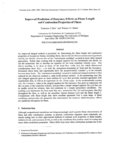 |
Diez, Francisco J.; Dahm, Werner J.A. | Improved prediction of buoyancy effects on flame length and combustion properties of flares | 2004 | An improved integral method is presented for determining the flame length and combustion properties of buoyant jet flames, including flares, that avoids the Morton entrainment hypothesis entirely and thereby removes the ad hoc "entrainment modeling" required in most other integral approaches. Rather... |
| 20 |
 |
Shore, David | Improving flare design a transition from art-form to engineering science | 2007 | Many of the day-to-day activities surrounding Flaring, at both the project design and operational stages, are vague and apparently outside the control of the Flare Engineer. Design specifications usually only cover a single case out of a multitude of possible compositions and flows. In service, flow... |
| 21 |
 |
Hong, J.; Baukal, C.; Bastianen, M.; Bellovich, J.; Leary, K. | Innovative steam-assisted flare technology | 2007 | A new steam-assisted flare has been developed which reduces or eliminates some of the potential limitations of conventional steam-assisted flares. The improved performance includes significantly reduced steam requirements (>30% reduction), elimination of two of the three steam supply lines, simplifi... |
| 22 |
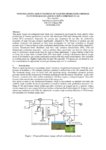 |
Jansohn, Peter | Investigations_about_Co_firing_of_gasified_herbaceous_biomass_in_an_integrated_gasification_combined_cycle | This paper focuses on combustion tests which were conducted to investigate the flame stability when product gas of biomass gasification is mixed with natural gas (NG) and subsequently burned in gas turbine (GT) combustors. Especially the product gas component H2 can alter the combustion properties o... | |
| 23 |
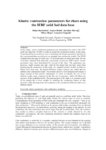 |
Karlstrom, Oskar; Brink, Anders; Hercog, Jaroslaw; Hupa, Mikko; Tognotti, Leonardo | Kinetic combustion parameters for chars using to IFRF solid fuel data base | 2009 | In this study, kinetic combustion parameters are determined for chars in the IFRF solid fuel data base (SFDB) in order to model the combustion history of the chars. Experimental burn-out data are used to determine the kinetic parameters that best fit the experimental data according to two standard c... |
| 24 |
 |
Pedel, Julien; Wu, Yuxin; Schmidt, John; Thornock, Jeremy; Smith, Philip J. | Large Eddy Simulation of a 15MW Tangentially Oxy-Fired Pulverized Coal Boiler: Ignitor | 2012-09-06 | |
| 25 |
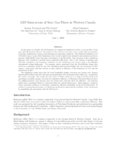 |
Thornock, Jeremy; Smith, Philip; Chambers, Allan K. | LES simulations of sour gas flares in Western Canada | 2009 | In this paper we describe the development of a numerical simulation tool for a sour gas flare of the type typically found in Alberta. The purpose of the model is to provide a way to guide safer sour gas flare operating conditions for varying environmental and operating conditions. The numerical simu... |
